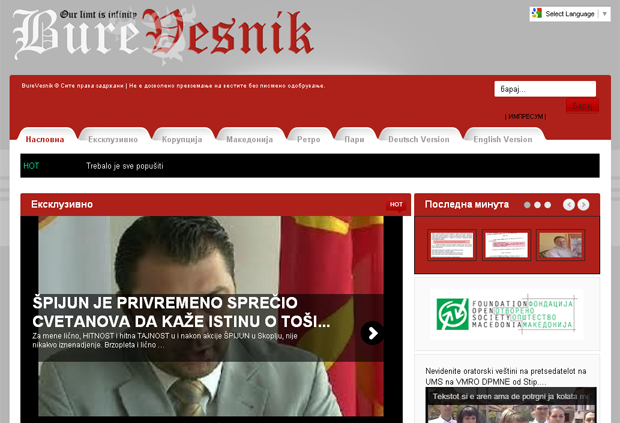Index relies entirely on the support of donors and readers to do its work.
Help us keep amplifying censored voices today.

Zoran Bozinovski, the owner of website Burevesnik, was arrested Thursday night in Novi Sad, Serbia. Bozinovski is charged with foreign espionage and criminal association.
Burevesnik is known for its critical coverage of the Macedonian government, led by Prime Minister Nikola Gruevski.
Macedonian authorities accuse Bozinovski of being part of a spy-ring working for a foreign government. He has previously denied the charges, telling Macedonian independent news site NOVA TV in September that “all the information that I gather I publicly declare my website Burevesnik.” He now faces 30 days in detention and extradition to Macedonia.
This comes only a day after journalist Tomislav Kezarovski was released from prison and put under house arrest. He was sentenced to four and half years in jail in October for reporting on the identity of a witness in a murder trial in 2008. The sentence came under criticism both nationally and internationally, with OSCE Media Freedom Representative Dunja Mijatovic declaring it had “serious consequences for free expression and media freedom” in the country.
Press freedom in Macedonia has been deteriorating for some time, with repressive legislation and increased hostility towards critical press from the government. The country ranks 116th out of 179 countries in the 2013 Reporters Without Borders press freedom index.
This article was originally posted on 8 Nov 2013 at indexoncensorship.org
A Macedonian investigative journalist has gone on hunger strike today, in protest against his continued detention.
The wife of Tomislav Kezarovski told local media that both she and her jailed husband are now on hunger strike, in hopes that it will call attention to his “absurd” situation.
Kezarovski has been held in Skopje’s Shutka prison since May, for a 2008 article he wrote for Reporter 92 magazine, for supposedly revealing the identity of a protected witness in an an ongoing murder investigation. However, in February this year the witness confessed that his testimony against the accused killers was fabricated, and that he did not have protected status until 2010.
Skopje criminal court decided in June to extend the journalist’s detention by 30 days, saying that if released, he may “escape or influence other witnesses” in a wider investigation. The court will decide this week whether or not he will be held for another 30 days. Since the investigation is now over, Kezarovski’s family members hope that he will be released.
The Macedonian Journalists Association, the Trade Union of Macedonian Journalists and Media Workers, SSNM, ZNM, and the Macedonian Institute for Media expressed “deep concern” over the journalist’s “fragile physical and mental” condition in a joint statement released today. In June, UN Rapporteur for free speech Frank LaRue was prevented from visiting Kezarovski in prison.
Reporters Without Borders has condemned the arrest of the journalist, as well as the “constant decline in freedom of information in Macedonia”, which ranks 116 out of 179 in the organisation’s 2013 press freedom index.
Sara Yasin is an Editorial Assistant at Index. She tweets from @missyasin
The International Partnership Group of freedom of expression organisations visited Macedonia last month to assess the state of media freedom in the country. Mike Harris reports on the findings